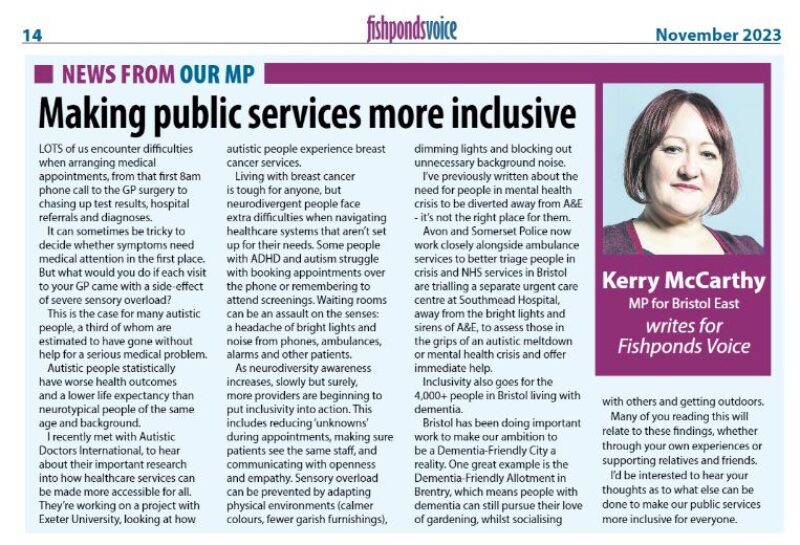Kerry McCarthy Labour MP for Bristol East
Kerry writes for Fishponds Voice, 1st November 2023
Lots of us encounter difficulties when arranging medical appointments – from that first 8am phone call to the GP surgery, to chasing up test results, hospital referrals and diagnoses. It can sometimes be tricky to decide whether symptoms need medical attention in the first place. But what would you do if each visit to your GP came with a side-effect of severe sensory overload?
This is the case for many autistic people, a third of whom are estimated to have gone without help for a serious medical problem. Autistic people statistically have worse health outcomes and a lower life expectancy than neurotypical people of the same age and background.
I recently met with Autistic Doctors International, to hear about their important research into how healthcare services can be made more accessible for all. They’re working on a project with Exeter University, looking at how autistic people experience breast cancer services.
Living with breast cancer is tough for anyone, but neurodivergent people face extra difficulties when navigating healthcare systems that aren’t set up for their needs. Some people with ADHD and autism struggle with booking appointments over the phone or remembering to attend screenings. Waiting rooms can be an assault on the senses: a headache of bright lights and noise from phones, ambulances, alarms and other patients.
As neurodiversity awareness increases, slowly but surely, more providers are beginning to put inclusivity into action. This includes reducing ‘unknowns’ during appointments, making sure patients see the same staff, and communicating with openness and empathy. Sensory overload can be prevented by adapting physical environments (calmer colours, fewer garish furnishings), dimming lights and blocking out unnecessary background noise.
I’ve previously written about the need for people in mental health crisis to be diverted away from A&Es; it’s not the right place for them. Avon and Somerset Police now work closely alongside ambulance services to better triage people in crisis and NHS services in Bristol are trialling a separate urgent care centre at Southmead Hospital, away from the bright lights and sirens of A&E, to assess those in the grips of an autistic meltdown or mental health crisis and offer immediate help.
Inclusivity also goes for the 4,000+ people in Bristol living with dementia. Bristol has been doing important work to make our ambition to be a Dementia Friendly City a reality. One great example is the Dementia-Friendly Allotment in Brentry, which means people with dementia can still pursue their love of gardening, whilst socialising with others and getting outdoors.
Many of you reading this will relate to these findings, whether through your own experiences or supporting relatives and friends. I’d be interested to hear your thoughts as to what else can be done to make our public services more inclusive for everyone.

